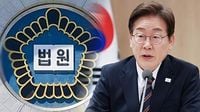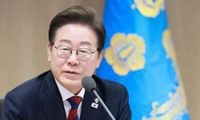On June 9, 2025, the Seoul High Court Criminal Division 7 announced a significant development in the ongoing legal proceedings involving South Korean President Lee Jae-myung. The court declared that the trial date for Lee's Public Official Election Act violation case, originally scheduled for June 18, 2025, has been postponed indefinitely, designated as 'future designation.' This decision aligns with Article 84 of the South Korean Constitution, which grants sitting presidents immunity from criminal prosecution, except in cases of insurrection or treason.
Article 84 explicitly states, "The President shall not be subject to criminal prosecution during their tenure, except for crimes of insurrection or treason." This constitutional clause has long been a subject of debate, particularly regarding whether ongoing trials fall under the umbrella of 'criminal prosecution.' The Seoul High Court's recent ruling interprets this immunity to include ongoing trials, effectively halting Lee's election law case while he remains in office.
Earlier this year, on May 1, 2025, the Supreme Court Full Bench overturned the initial acquittal of Lee Jae-myung in his Public Official Election Act violation case, remanding it with a guilty verdict to the Seoul High Court for retrial. The lower court initially scheduled the first hearing for May 15, 2025, before the presidential election, but postponed it to June 18, 2025, in response to Lee's request to ensure a fair election campaign opportunity.
However, with Lee's inauguration as president, the legal landscape shifted dramatically. The Seoul High Court determined that proceeding with the trial during his presidency would contravene the constitutional protections afforded by Article 84. Consequently, the court has refrained from setting a new trial date, effectively suspending the election law case for the duration of Lee's term.
This development has stirred considerable discussion within political and legal circles. The question of whether 'criminal prosecution' in Article 84 encompasses ongoing trials, including those already in progress, has been contentious. The Supreme Court previously deferred this interpretation to the discretion of the trial courts, which has now been exercised by the Seoul High Court in Lee's case.
Lee Jae-myung is not alone in facing multiple legal challenges. Besides the Public Official Election Act case, he is currently involved in five other trials: the second-instance Wi-seongyo-sa (perjury coaching) case, first-instance trials concerning the Daejang-dong, Wirye, Baekhyeon-dong, and Seongnam FC incidents, the Ssangbangwool North Korea remittance case, and a corporate card misuse case. Notably, the Daejang-dong case, handled by the Seoul Central District Court, has maintained its scheduled hearing date of June 24, 2025, unaffected by the constitutional immunity ruling.
The political ramifications of the court's decision are already unfolding. The Democratic Party is reportedly preparing to introduce a revision to the Criminal Procedure Act, colloquially known as the 'Trial Suspension Act.' This legislation aims to suspend ongoing trials of a presidential candidate upon their election, effectively extending the immunity principle legislatively. The bill is slated for discussion in the National Assembly's plenary session on June 12, 2025.
Should this bill pass, it would not only affect Lee's Public Official Election Act case but also potentially suspend his other ongoing criminal trials, including the Daejang-dong and Wi-seongyo-sa cases. However, the proposed legislation faces its own hurdles, as constitutional appeals challenging its validity are anticipated. The Constitutional Court's eventual ruling on this matter could decisively determine the scope and application of presidential immunity during Lee's term.
This situation underscores the complex interplay between constitutional law, judicial proceedings, and political strategy in South Korea. While the President enjoys constitutional immunity, the public and political stakeholders remain watchful of how these legal protections are applied, especially concerning high-profile cases with significant implications for governance and public trust.
For now, the Seoul High Court's decision to postpone Lee Jae-myung's election law trial exemplifies the judiciary's cautious approach to respecting constitutional provisions while navigating politically sensitive cases. As the President's term continues, the legal battles surrounding him will likely remain in a state of suspension, pending further legislative and judicial clarifications.





